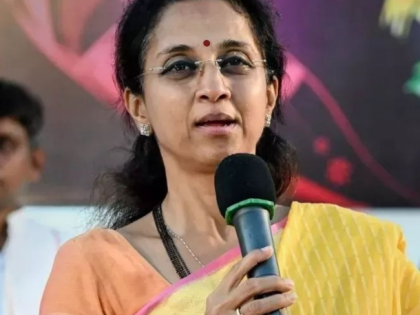"Everything Connected to Lok Sabha Elections": MP Supriya Sule on CAA Implementation
By Lokmat English Desk | Published: March 12, 2024 09:21 PM2024-03-12T21:21:10+5:302024-03-12T21:23:26+5:30
National Congress Party (NCP) - Sharad Pawar faction leader and Member of Parliament, Supriya Sule, has raised questions regarding ...

"Everything Connected to Lok Sabha Elections": MP Supriya Sule on CAA Implementation
National Congress Party (NCP) - Sharad Pawar faction leader and Member of Parliament, Supriya Sule, has raised questions regarding the timing of the implementation of the Citizenship Amendment Act (CAA), linking it to the upcoming Lok Sabha elections.
The Centre implemented the CAA by notifying the rules four years after the contentious law was passed by Parliament to fast-track citizenship for undocumented non-Muslim migrants from Pakistan, Bangladesh and Afghanistan who came to India before December 31, 2014. With this, the Centre will now start granting Indian nationality to persecuted non-Muslim migrants from the three countries.
#WATCH | Mumbai: On implementation of CAA, NCP-SCP leader and MP Supriya Sule says, " Everything that is going to happen in the next week is obviously going to be connected to Lok Sabha elections. Why didn't they implement it till now, maybe this was to cover up the electoral… pic.twitter.com/oVHyLelu4U
— ANI (@ANI) March 12, 2024
Read Also | What Is CAA? All You Need To Know About Citizenship Amendment Act Rules
"Everything that is going to happen in the next week is obviously going to be connected to Lok Sabha elections. Why didn't they implement it till now, maybe this was to cover up the electoral bond and Paytm issues, but that won't happen. This nation wants to know what happened in electoral bonds and Paytm, what is the truth and who is behind this," Supriya Sule said.
The Union Home Ministry officially notified the rules for the implementation of the Citizenship Amendment Act (CAA) on Monday, a move anticipated ahead of the impending Lok Sabha election schedule announcement. The rules, formulated by the Narendra Modi government and passed by Parliament in 2019, aim to grant Indian citizenship to persecuted non-Muslim migrants from Bangladesh, Pakistan, and Afghanistan who arrived in India before December 31, 2014. Eligible communities include Hindus, Sikhs, Jains, Buddhists, Parsis, and Christians. The rules also state that the applicants will have to provide an eligibility certificate issued by a locally reputed community institution confirming that he/she belongs to "Hindu/ Sikh/ Buddhist/ Jain/ Parsi/ Christian community and continues to be a member of the above mentioned community. The applicants will also have to give a declaration that they "irrevocably" renounce the existing citizenship and that they want to make "India as permanent home", according to the rules.
Read Also | How to Apply for Indian Citizenship Under The 2019 Act Online: Step-by-Step Guide and FAQs
Open in app